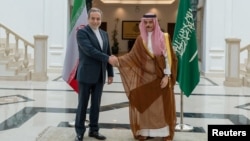Iran has put forward a proposal to the United States and its Gulf Arab neighbors in an attempt to accelerate negotiations and ease concerns about its nuclear program.
The plan, presented by Iranian Foreign Minister Abbas Araqchi during a fourth round of talks with the United States in Oman on May 11, envisions the creation of a regional nuclear consortium that would include Iran, Saudi Arabia, and the United Arab Emirates, with the potential for American involvement.
With both Iranian and US officials silent, details about the consortium remain scarce.
What Do We Know About The Proposal?
The Iranian daily newspaper Khorasan, which was the first to report the story, said the proposed consortium is intended to reassure both Western and regional actors about Iran's commitment to nuclear transparency and safety while allowing the country to maintain control over its nuclear advancements through international cooperation.
Media quoting Iranian officials and sources familiar with the initiative say the consortium would allow Iran to continue enriching uranium but only to low levels suitable for civilian energy purposes -- well below the threshold required for nuclear weapons.
The enriched uranium would then be distributed to participating Arab countries for peaceful use. Crucially, the arrangement would involve the permanent on-site presence of representatives from the partner nations, and potentially the United States, to ensure transparency and compliance.
The proposal marks a significant departure from Washington's demand that Iran give up all uranium-enrichment capabilities and dismantle key nuclear facilities. US officials have so far not commented publicly on the offer, and it remains unclear whether President Donald Trump's administration will be open to any deal that allows enrichment on Iranian soil.
Mehran Mostafavi, a France-based academic and nuclear expert, said the initiative has potential but would be difficult to implement.
Speaking to RFE/RL's Radio Farda, he said the consortium could "significantly reduce the risk" of nuclear proliferation in the Middle East -- provided that major regional powers are involved.
"But the main issue is whether the Islamic republic can be trusted," Mostafavi said. "For trust to exist, the regime must be rooted in the will of the people -- but such a thing does not exist in Iran."
He added that, while establishing the consortium is "not impossible," the lack of trust in Iran's political system "undermines" its feasibility.
An Old Idea At A Critical Time
The consortium idea is not entirely new. In fact, Iran once proposed the creation of an international consortium back in 2008 to ease tensions and break a deadlock over its nuclear program. The initiative received little interest from Western nations, particularly because they opposed any enrichment taking place on Iranian soil.
With European powers threatening to trigger the 2015 nuclear deal's "snapback" of UN sanctions against Iran if there is no deal by the end of the June, the window is closing for Tehran to settle the issue with Washington.
Trump echoed this sentiment during his visit to Saudi Arabia this week, reiterating his desire for a diplomatic solution but warning that time is running out for Iran to make concessions before facing increased economic pressure.
Iran has been trying to strengthen its relations with both the Saudis and the Emiratis over the past two years. The Saudis, who are pursuing their own civil nuclear program with Washington's cooperation, have backed US talks with Iran.
Araqchi traveled to Riyadh and Abu Dhabi just ahead of Trump's regional tour, likely to discuss the initiative with the Arab states to get Trump on board.
Some analysts see the proposed consortium as a potential confidence-building measure that could open the door to broader regional security talks, but whether Washington sees it that way remains unclear.










